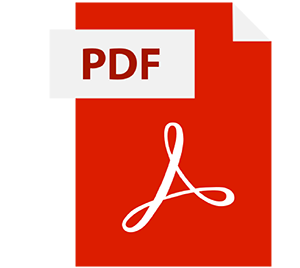Overview
TikTok has become an increasingly popular social media platform in Pakistan. G5iO compared some of the most salient and recent online discussions on Twitter to see whether those same issues were also present on Tik Tok to understand its key themes and topics better. These issues comprised the recent monsoon spell in Karachi (a governance issue), the Supreme Court’s decision regarding the CM Punjab elections (a Political topic), and Sri Lanka vs. Pakistan test series (a Sports event). Our study aimed to (a) find the extent to which the narratives related to these topics converged or diverged across platforms and (b) which types of actors and influencers garnered the most engagement.
Methodology
We listed top hashtags from the Twitter panel between 17 to 27 July and then categorized them around key themes such as politics, sports, and governance. The graph below shows the top three most recurring hashtags from each of these categories comprising: #PakvsSl (Sports), #KarachiRains (Governance), and #SupremeCourtOfPakistan (Politics). Next, we scraped Twitter data from its rest API comprising 127,611 tweets. Finally, for TikTok, we used Rapid API to get TikTok data for our chosen trends consisting of a total of 1200 video posts. These trends/hashtags were then analyzed to gauge their relative engagement, key actors, and narratives in an exploratory manner to see how both social media platforms differed, if at all.
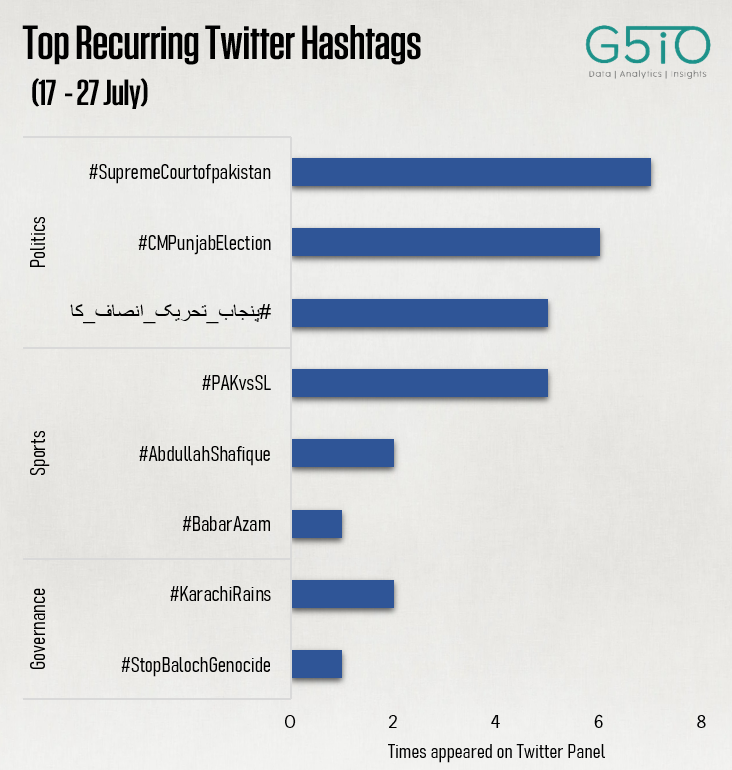
Comparative engagement on different Hashtags
On TikTok, content that received the highest engagement was varied. For example, in comparison to Political content, socio-political content received much more engagement, as evident from the Tik Tok Data on #KarachiRains and cricket (PakvsSI).
In contrast, on Twitter, political content received a lot more engagement. For example, the top ten users on Twitter with the highest engagement were all on the hashtag related to the supreme court of Pakistan, out of which three accounts belonged to news networks.
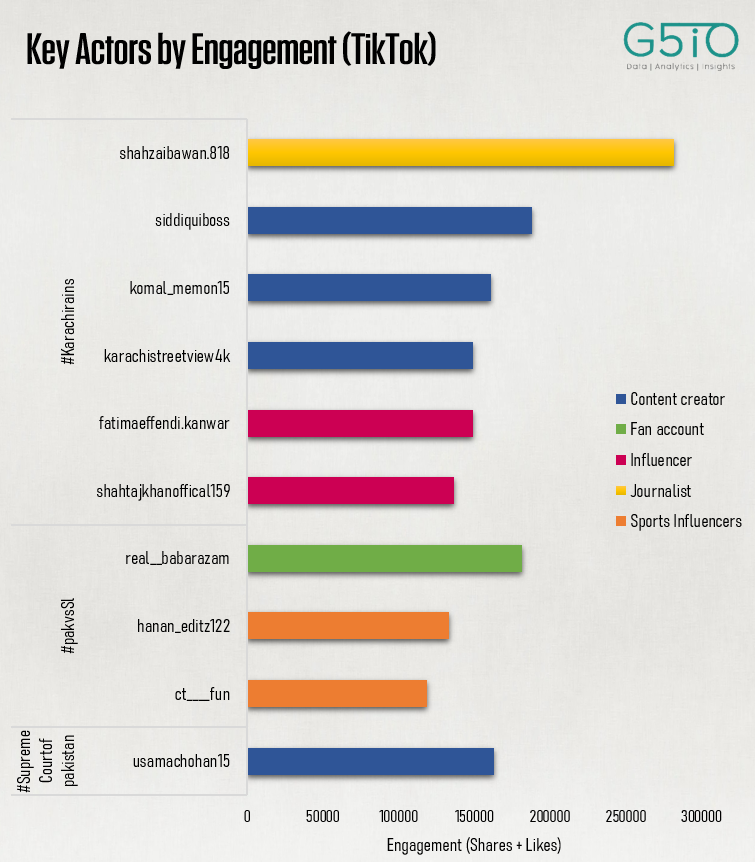
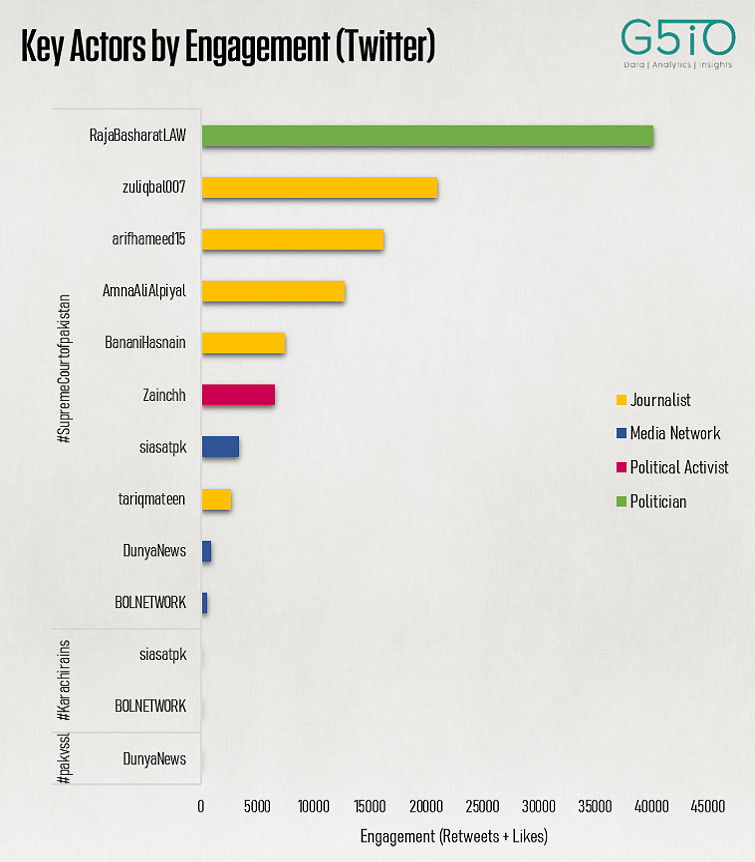
Top Accounts on Twitter and TikTok
Building on the above, we compared key influencers across both Twitter and TikTok based on their number of followers from within our data set. Our data showed that the top 10 most followed accounts on Twitter all belonged to news agencies and journalists. In contrast, the top accounts followed on TikTok comprised a mix of individual influencers from varied domains, including cricket, politics, and governance. Hence, this shows that Twitter is mainly dominated by political narratives influenced by journalists and media networks aimed at a more politically aware audience. In contrast, TikTok influencers are content creators who, while highlighting similar issues, have a much larger reach and following than most established media networks on Twitter.
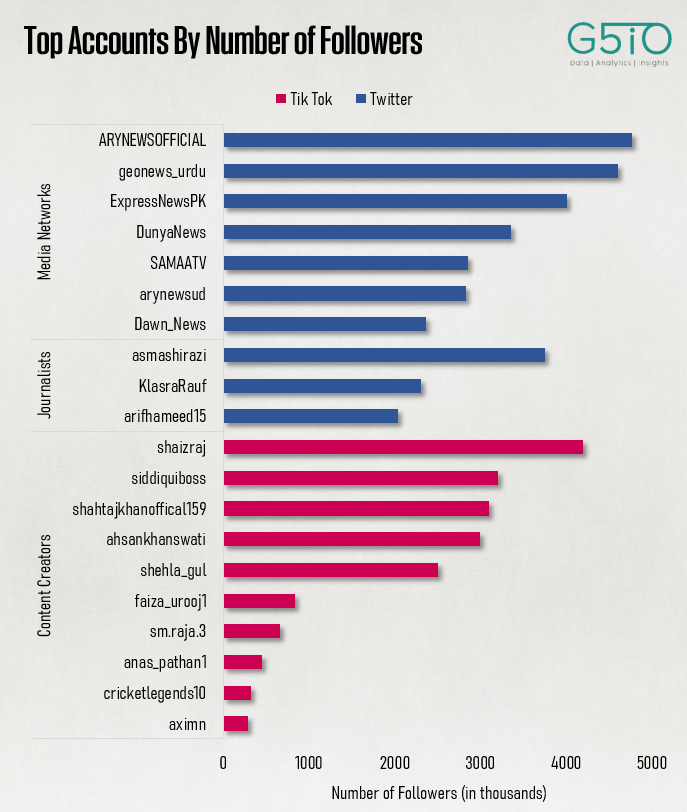
Narratives reach on Twitter and TikTok
Impressions on Twitter indicate the total number of times a tweet has been seen. For example, the hashtag #SupremeCourtofPakistan received the highest impressions compared to other trends, which shows the popularity of political content on Twitter. On the other hand, on TikTok, sports-related videos received much higher play counts, with political trends showing significantly lower play counts. This points to perhaps one of the most fundamental differences between both platforms. It shows that while there is a much larger audience for political content on Twitter, TikTok primarily serves as a platform for Entertainment and lifestyle-related content.
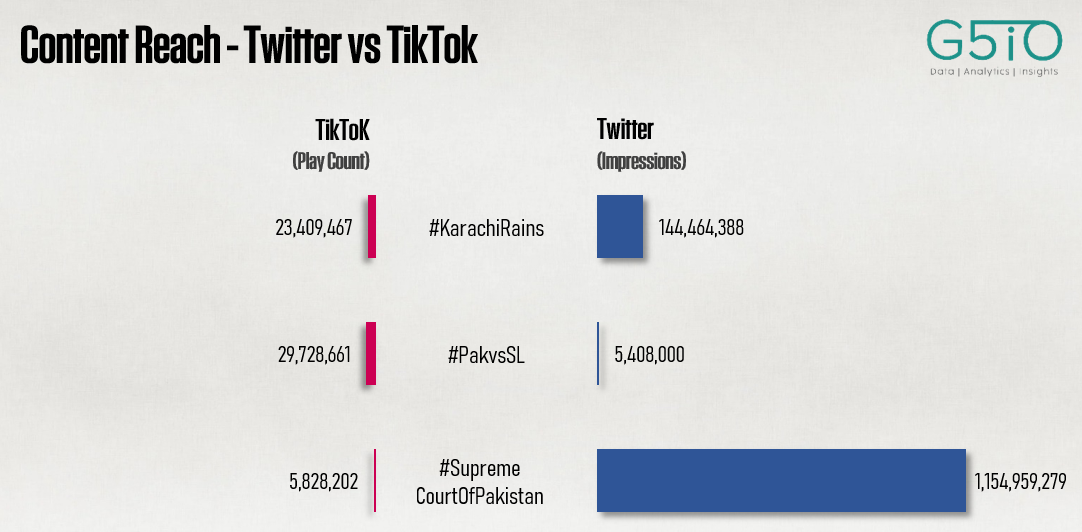
Content Analysis of Similar Hashtags on Twitter and TikTok
A content analysis of our data shows that narratives around the Karachi rains were more politically charged and polarized on Twitter, where users criticized the Pakistan People’s Party (PPP) for “Power” outages, “drainage” problems, and poor “administration” during the monsoon season in Sindh. In contrast, while some criticism of PPP on TikTok, users also posted videos about travel, views, rainbows, beauty, and the weather – all of which are more attuned to the entertainment and lifestyle-oriented phenomena of TikTok users. The #Karachirains thus provides the best example of divergence of narratives between these two platforms, where the same phenomenon presented as part of a broader political narrative on Twitter is instead shared as more of a leisurely activity on TikTok.
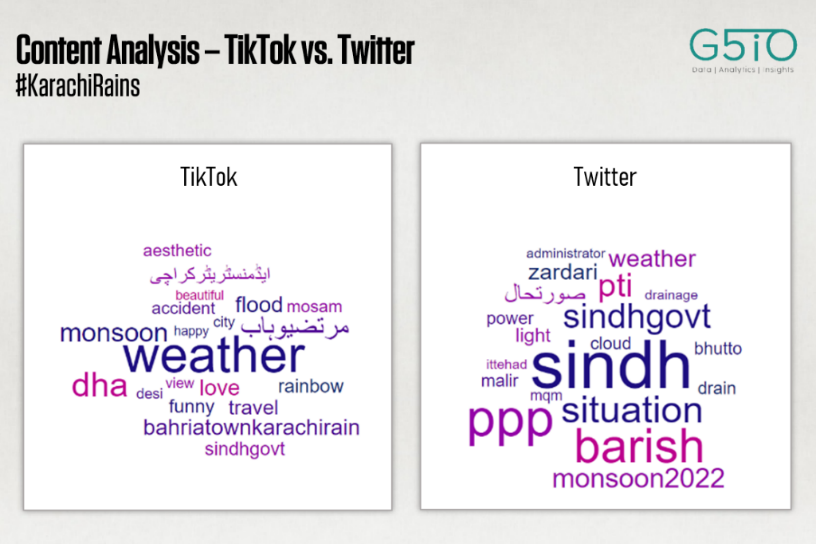
However, the narrative on sports-related hashtags such as #PakvsSl is much more similar on both platforms. For instance, Babar Azam and Muhammad Rizwan were among the most mentioned players within these trends across both platforms. Hence, sports-related hashtags like #PakvsSl exemplify areas of narrative convergence for both these platforms, where the content is mainly focused on players, their performances, and key moments in the match.
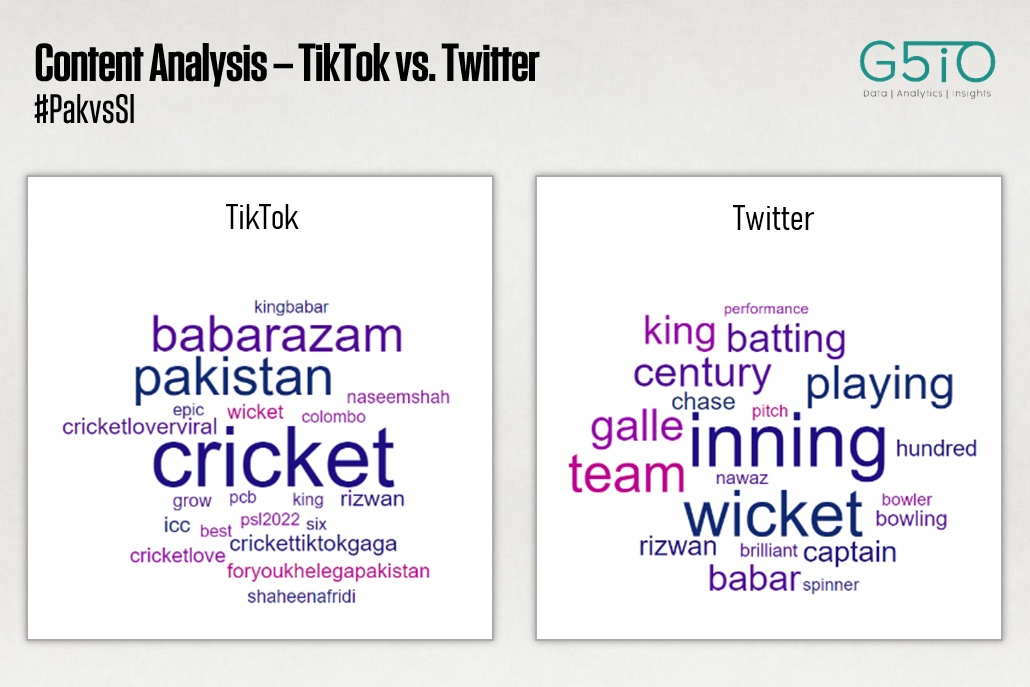
While the previous two trends presented an excellent example of narrative divergence and convergence, narratives for the trend #SupremeCourtOfPakistan while appearing similar, were still different in several important ways. For instance, the narrative on TikTok was limited to glorifying political personalities like Imran Khan and Parvez Elahi. In contrast, political narratives on Twitter were a lot more nuanced, focusing on the actual decision of the Supreme court and its finer details – and that too catering to a more politically savvy and polarized Twitter audience.
Hence, politics-related trends, while already serving as a mainstay of Twitter discourses are increasingly becoming popular on TikTok – albeit as part of Tik Tok’s specific yet fast permeating sub-culture.
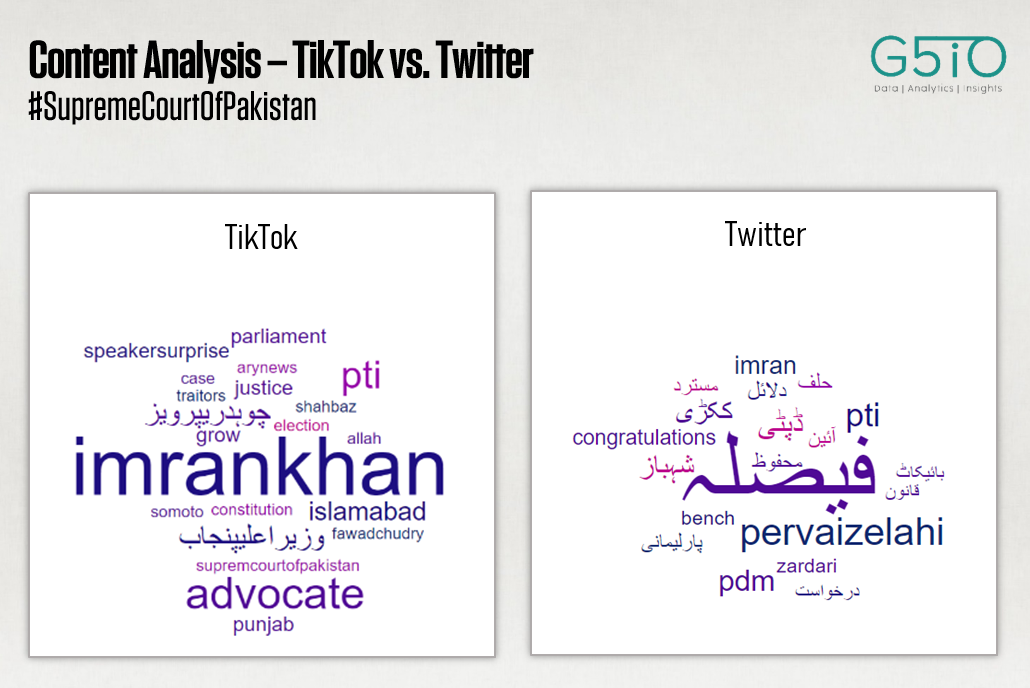
Conclusion
- While inherently different in form, content across these platforms is also geared towards different audiences.
- Social media content on Twitter is a lot more nuanced and more attuned toward discourses prevalent across daily news cycles
- Tik Tok content, in contrast, while having its fast-growing subculture within the lifestyle and entertainment niche, is fast incorporating more mainstream themes primarily related to politics
- On Twitter, the main narrative setters are primarily journalists and media houses, whereas, on TikTok, it is ‘Tik Tokers’ who reigns supreme as part of a new generation of social media influencers
- Nevertheless, politics-related posts are likelier to get much more engagement on Twitter, contrary to TikTok, where videos related to sports and more general trends still receive much higher engagement.
